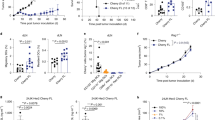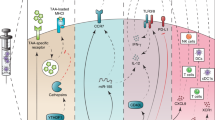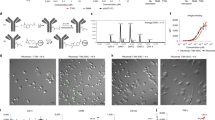Abstract
A number of monoclonal antibodies (mAbs) have been studied for their ability to enhance immune responses. Although these antibodies are effective in pre-clinical and clinical studies, they are costly and have occasionally been associated with adverse effects such as autoimmunity and cytokine storm. Numerous studies have shown that treatment of mice with an agonistic mAb, clone DTA-1, targeting murine glucocorticoid-induced tumor necrosis factor receptor (GITR) results in enhanced immune responses in tumor-bearing animals. Herein, we evaluate the novel approach of transfecting dendritic cell (DC) with mRNA encoding the heavy and light chain of the anti-GITR mAb. We show the induction of significantly enhanced tumor immunity by vaccinating with a combination of anti-GITR-secreting DC and tumor antigen-presenting DC. This enhancement is comparable to that seen with systemically delivered mAb along with the antigen-presenting DC. Importantly, when anti-GITR was delivered using RNA-transfected DC, we observed no evidence of autoimmune hypopigmentation in any tumor-free mice. We also show enhanced induction of cytotoxic T-lymphocyte responses, which is only observed when the antigen-presenting and antibody-secreting DC are co-injected at the same site. To illustrate the broad utility of this strategy, we show that DC transfected with mRNA encoding GITR-ligand/Fc fusion protein is also an effective tumor vaccine adjuvant.
This is a preview of subscription content, access via your institution
Access options
Subscribe to this journal
Receive 12 print issues and online access
$259.00 per year
only $21.58 per issue
Buy this article
- Purchase on Springer Link
- Instant access to full article PDF
Prices may be subject to local taxes which are calculated during checkout





Similar content being viewed by others
Abbreviations
- DC:
-
dendritic cells
- GITR:
-
glucocorticoid-induced TNF receptor
- H+L:
-
heavy and light
- LN:
-
lymph node
- mAb:
-
monoclonal antibody
- OVA:
-
chicken ovalbumin
- Treg:
-
regulatory T cell
References
Rosenberg SA, Yang JC, Restifo NP . Cancer immunotherapy: moving beyond current vaccines. Nat Med 2004; 10: 909–915.
Steinman RM, Banchereau J . Taking dendritic cells into medicine. Nature 2007; 449: 419–426.
Gilboa E . DC-based cancer vaccines. J Clin Invest 2007; 117: 1195–1203.
Fong L, Engleman EG . Dendritic cells in cancer immunotherapy. Annu Rev Immunol 2000; 18: 245–273.
Sakaguchi S, Ono M, Setoguchi R, Yagi H, Hori S, Fehervari Z et al. Foxp3+ CD25+ CD4+ natural regulatory T cells in dominant self-tolerance and autoimmune disease. Immunol Rev 2006; 212: 8–27.
Dranoff G . The therapeutic implications of intratumoral regulatory T cells. Clin Cancer Res 2005; 11: 8226–8229.
Nomura T, Sakaguchi S . Naturally arising CD25+CD4+ regulatory T cells in tumor immunity. Curr Top Microbiol Immunol 2005; 293: 287–302.
Rudensky AY, Campbell DJ . In vivo sites and cellular mechanisms of T reg cell-mediated suppression. J Exp Med 2006; 203: 489–492.
Curiel TJ, Coukos G, Zou L, Alvarez X, Cheng P, Mottram P et al. Specific recruitment of regulatory T cells in ovarian carcinoma fosters immune privilege and predicts reduced survival. Nat Med 2004; 10: 942–949.
Fecci PE, Mitchell DA, Whitesides JF, Xie W, Friedman AH, Archer GE et al. Increased regulatory T-cell fraction amidst a diminished CD4 compartment explains cellular immune defects in patients with malignant glioma. Cancer Res 2006; 66: 3294–3302.
Woo EY, Yeh H, Chu CS, Schlienger K, Carroll RG, Riley JL et al. Cutting edge: regulatory T cells from lung cancer patients directly inhibit autologous T cell proliferation. J Immunol 2002; 168: 4272–4276.
Zhou G, Drake CG, Levitsky HI . Amplification of tumor-specific regulatory T cells following therapeutic cancer vaccines. Blood 2006; 107: 628–636.
Melero I, Hervas-Stubbs S, Glennie M, Pardoll DM, Chen L . Immunostimulatory monoclonal antibodies for cancer therapy. Nat Rev Cancer 2007; 7: 95–106.
Murillo O, Arina A, Tirapu I, Alfaro C, Mazzolini G, Palencia B et al. Potentiation of therapeutic immune responses against malignancies with monoclonal antibodies. Clin Cancer Res 2003; 9: 5454–5464.
Hodi FS, Mihm MC, Soiffer RJ, Haluska FG, Butler M, Seiden MV et al. Biologic activity of cytotoxic T lymphocyte-associated antigen 4 antibody blockade in previously vaccinated metastatic melanoma and ovarian carcinoma patients. Proc Natl Acad Sci USA 2003; 100: 4712–4717.
Maker AV, Yang JC, Sherry RM, Topalian SL, Kammula US, Royal RE et al. Intrapatient dose escalation of anti-CTLA-4 antibody in patients with metastatic melanoma. J Immunother 2006; 29: 455–463.
Phan GQ, Yang JC, Sherry RM, Hwu P, Topalian SL, Schwartzentruber DJ et al. Cancer regression and autoimmunity induced by cytotoxic T lymphocyte-associated antigen 4 blockade in patients with metastatic melanoma. Proc Natl Acad Sci USA 2003; 100: 8372–8377.
Small EJ, Tchekmedyian NS, Rini BI, Fong L, Lowy I, Allison JP . A pilot trial of CTLA-4 blockade with human anti-CTLA-4 in patients with hormone-refractory prostate cancer. Clin Cancer Res 2007; 13: 1810–1815.
Cranmer LD, Hersh E . The role of the CTLA4 blockade in the treatment of malignant melanoma. Cancer Invest 2007; 25: 613–631.
Suntharalingam G, Perry MR, Ward S, Brett SJ, Castello-Cortes A, Brunner MD . Cytokine storm in a phase 1 trial of the anti-CD28 monoclonal antibody TGN1412. N Engl J Med 2006; 355: 1018–1028.
Carter P . Improving the efficacy of antibody-based cancer therapies. Nat Rev Cancer 2001; 1: 118–129.
Cohen AD, Diab A, Perales MA, Wolchok JD, Rizzuto G, Merghoub T et al. Agonist anti-GITR antibody enhances vaccine-induced CD8(+) T-cell responses and tumor immunity. Cancer Res 2006; 66: 4904–4912.
Kanamaru F, Youngnak P, Hashiguchi M, Nishioka T, Takahashi T, Sakaguchi S et al. Costimulation via glucocorticoid-induced TNF receptor in both conventional and CD25+ regulatory CD4+ T cells. J Immunol 2004; 172: 7306–7314.
Ko K, Yamazaki S, Nakamura K, Nishioka T, Hirota K, Yamaguchi T et al. Treatment of advanced tumors with agonistic anti-GITR mAb and its effects on tumor-infiltrating Foxp3+CD25+CD4+ regulatory T cells. J Exp Med 2005; 202: 885–891.
La S, Kim E, Kwon B . In vivo ligation of glucocorticoid-induced TNF receptor enhances the T-cell immunity to herpes simplex virus type 1. Exp Mol Med 2005; 37: 193–198.
Ramirez-Montagut T, Chow A, Hirschhorn-Cymerman D, Terwey TH, Kochman AA, Lu S et al. Glucocorticoid-induced TNF receptor family related gene activation overcomes tolerance/ignorance to melanoma differentiation antigens and enhances antitumor immunity. J Immunol 2006; 176: 6434–6442.
Shimizu J, Yamazaki S, Takahashi T, Ishida Y, Sakaguchi S . Stimulation of CD25(+)CD4(+) regulatory T cells through GITR breaks immunological self-tolerance. Nat Immunol 2002; 3: 135–142.
Zhou P, L'Italien L, Hodges D, Schebye XM . Pivotal roles of CD4+ effector T cells in mediating agonistic anti-GITR mAb-induced-immune activation and tumor immunity in CT26 tumors. J Immunol 2007; 179: 7365–7375.
Shevach EM, Stephens GL . The GITR-GITRL interaction: co-stimulation or contrasuppression of regulatory activity? Nat Rev Immunol 2006; 6: 613–618.
Nocentini G, Riccardi C . GITR: a multifaceted regulator of immunity belonging to the tumor necrosis factor receptor superfamily. Eur J Immunol 2005; 35: 1016–1022.
Nocentini G, Giunchi L, Ronchetti S, Krausz LT, Bartoli A, Moraca R et al. A new member of the tumor necrosis factor/nerve growth factor receptor family inhibits T cell receptor-induced apoptosis. Proc Natl Acad Sci USA 1997; 94: 6216–6221.
Stephens GL, McHugh RS, Whitters MJ, Young DA, Luxenberg D, Carreno BM et al. Engagement of glucocorticoid-induced TNFR family-related receptor on effector T cells by its ligand mediates resistance to suppression by CD4+CD25+ T cells. J Immunol 2004; 173: 5008–5020.
Tone M, Tone Y, Adams E, Yates SF, Frewin MR, Cobbold SP et al. Mouse glucocorticoid-induced tumor necrosis factor receptor ligand is costimulatory for T cells. Proc Natl Acad Sci USA 2003; 100: 15059–15064.
Nair S, Boczkowski D, Fassnacht M, Pisetsky D, Gilboa E . Vaccination against the forkhead family transcription factor Foxp3 enhances tumor immunity. Cancer Res 2007; 67: 371–380.
Nair S, Boczkowski D, Moeller B, Dewhirst M, Vieweg J, Gilboa E . Synergy between tumor immunotherapy and antiangiogenic therapy. Blood 2003; 102: 964–971.
Nair SK, Heiser A, Boczkowski D, Majumdar A, Naoe M, Lebkowski JS et al. Induction of cytotoxic T cell responses and tumor immunity against unrelated tumors using telomerase reverse transcriptase RNA transfected dendritic cells. Nat Med 2000; 6: 1011–1017.
Lee J, Dollins CM, Boczkowski D, Sullenger BA, Nair S . Activated B cells modified by electroporation of multiple mRNAs encoding immune stimulatory molecules are comparable to mature dendritic cells in inducing in vitro antigen-specific T-cell responses. Immunology 2008; 125: 229–240.
Porgador A, Feldman M, Eisenbach L . H-2 Kb transfection of B16 melanoma cells results in reduced tumourigenicity and metastatic competence. J Immunogenet 1989; 16: 291–303.
Nishikawa H, Kato T, Hirayama M, Orito Y, Sato E, Harada N et al. Regulatory T cell-resistant CD8+ T cells induced by glucocorticoid-induced tumor necrosis factor receptor signaling. Cancer Res 2008; 68: 5948–5954.
Ye Z, Hellstrom I, Hayden-Ledbetter M, Dahlin A, Ledbetter JA, Hellstrom KE . Gene therapy for cancer using single-chain Fv fragments specific for 4-1BB. Nat Med 2002; 8: 343–348.
Simmons AD, Moskalenko M, Creson J, Fang J, Yi S, VanRoey MJ et al. Local secretion of anti-CTLA-4 enhances the therapeutic efficacy of a cancer immunotherapy with reduced evidence of systemic autoimmunity. Cancer Immunol Immunother 2008; 57: 1263–1270.
Chen L, Huang TG, Meseck M, Mandeli J, Fallon J, Woo SL . Rejection of metastatic 4T1 breast cancer by attenuation of Treg cells in combination with immune stimulation. Mol Ther 2007; 15: 2194–2202.
Hu P, Arias RS, Sadun RE, Nien YC, Zhang N, Sabzevari H et al. Construction and preclinical characterization of Fc-mGITRL for the immunotherapy of cancer. Clin Cancer Res 2008; 14: 579–588.
McHugh RS, Whitters MJ, Piccirillo CA, Young DA, Shevach EM, Collins M et al. CD4(+)CD25(+) immunoregulatory T cells: gene expression analysis reveals a functional role for the glucocorticoid-induced TNF receptor. Immunity 2002; 16: 311–323.
Kim J, Choi WS, Kang H, Kim HJ, Suh JH, Sakaguchi S et al. Conversion of alloantigen-specific CD8+ T cell anergy to CD8+ T cell priming through in vivo ligation of glucocorticoid-induced TNF receptor. J Immunol 2006; 176: 5223–5231.
Kohm AP, Williams JS, Miller SD . Cutting edge: ligation of the glucocorticoid-induced TNF receptor enhances autoreactive CD4+ T cell activation and experimental autoimmune encephalomyelitis. J Immunol 2004; 172: 4686–4690.
Ronchetti S, Zollo O, Bruscoli S, Agostini M, Bianchini R, Nocentini G et al. GITR, a member of the TNF receptor superfamily, is costimulatory to mouse T lymphocyte subpopulations. Eur J Immunol 2004; 34: 613–622.
Tuyaerts S, Van Meirvenne S, Bonehill A, Heirman C, Corthals J, Waldmann H et al. Expression of human GITRL on myeloid dendritic cells enhances their immunostimulatory function but does not abrogate the suppressive effect of CD4+CD25+ regulatory T cells. J Leukoc Biol 2007; 82: 93–105.
Acknowledgements
We thank David Snyder for assistance with animal studies. We are grateful to Dr Eli Gilboa (University of Miami, Miami, FL) and Dr Bruce Sullenger (Duke University, Durham, NC) for helpful comments and Dr Shimon Sakaguchi (Kyoto University, Japan) for providing us with the DTA-1 anti-GITR hybridoma.
Author information
Authors and Affiliations
Corresponding author
Additional information
Supplementary Information accompanies the paper on Cancer Gene Therapy website (http://www.nature.com/cgt)
Supplementary information
Rights and permissions
About this article
Cite this article
Boczkowski, D., Lee, J., Pruitt, S. et al. Dendritic cells engineered to secrete anti-GITR antibodies are effective adjuvants to dendritic cell-based immunotherapy. Cancer Gene Ther 16, 900–911 (2009). https://doi.org/10.1038/cgt.2009.39
Received:
Revised:
Accepted:
Published:
Issue Date:
DOI: https://doi.org/10.1038/cgt.2009.39
Keywords
This article is cited by
-
mRNA therapeutics in cancer immunotherapy
Molecular Cancer (2021)
-
Varied functions of immune checkpoints during cancer metastasis
Cancer Immunology, Immunotherapy (2021)
-
Local Administration of GITR Agonistic Antibody Induces a Stronger Antitumor Immunity than Systemic Delivery
Scientific Reports (2019)
-
mRNA vaccines — a new era in vaccinology
Nature Reviews Drug Discovery (2018)
-
Targeting tumor-necrosis factor receptor pathways for tumor immunotherapy
Journal for ImmunoTherapy of Cancer (2014)



